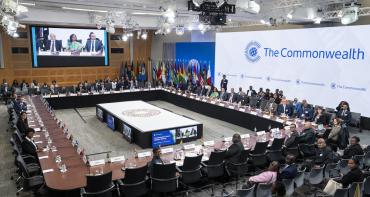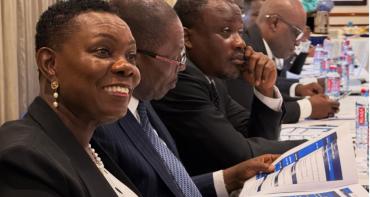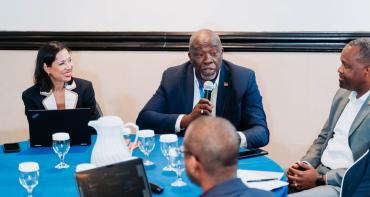London, 17 April 2013 ‒ Finance ministers, central bank governors and senior officials from Commonwealth and La Francophonie countries will meet in Washington DC on 21 April 2013 to rub minds on how to draw greater awareness to their concerns with the G20 - the forum of the world’s largest economies.
The Commonwealth and La Francophonie have organised the meeting, together with Russia, which is holding this year’s G20 Presidency. It will take place at the International Monetary Fund (IMF) headquarters on the margins of the 2013 World Bank/IMF Spring Meetings in Washington DC.
Representing almost 100 countries together, the Commonwealth and La Francophonie aim to ensure that the G20 agenda focuses strongly on the development concerns of the poorest, smallest and most vulnerable countries not at the G20 table when these influential economic powers discuss the world economy.
Dr Cyrus Rustomjee, Director of Economic Affairs at the Commonwealth Secretariat, who is leading the Commonwealth team to Washington DC, says discussions will examine how best to prioritise development policy issues to be taken up by the Commonwealth with the G20 in the period ahead.
The meeting will start with an annual dialogue between Commonwealth countries not in the G20, with those in the G20 family. Out of the 54 Commonwealth countries, five, namely, Australia, Canada, India, South Africa and the United Kingdom, are G20 members.
The dialogue is a brainchild of Commonwealth leaders, following their meeting in Perth, Australia, in October 2011. Their aim was to create greater awareness and attention of development issues.
Later in the day, there will be an outreach meeting with the G20 Development Working Group to pursue extensive work on several priority issues in development. Many of these have direct relevance for developing countries of the Commonwealth and La Francophonie.
“Discussions will focus on the Post-2015 Development Framework, long-term financing for infrastructure and financial inclusion, all of which are major policy priorities for most of the poorest, smallest and vulnerable countries,” Dr Rustomjee said.
Russia has indicated a strong commitment to reach out to countries outside the G20 during its presidency.
A statement from the Russian G20 Presidency website said: “To ensure legitimacy, transparency and efficiency of the G20, the Russian Presidency plans to hold extensive outreach consultations with all interested parties, including non-G20 countries, international organisations, the private sector, trade unions, civil society, youth, think tanks and academia. Active interaction among all these groups - another innovation of the Russian Presidency - will generate a cross-sectorial synergy to enhance the public benefit of the G20.”
The G20 brings together finance ministers and central bank governors from 19 countries: Argentina, Australia, Brazil, Canada, China, France, Germany, India, Indonesia, Italy, Japan, the Republic of Korea, Mexico, Russia, Saudi Arabia, South Africa, Turkey, the United Kingdom, the United States of America plus the European Union, which is represented by the President of the European Council and by the Head of the European Central Bank.
Since it was formally established in September 1999, the G20 has played a key role in policy coordination to achieve global economic stability and sustainable growth. It has promoted financial regulations to reduce the risks and prevent financial crises, and helped in modernising international financial regulations. However, there have been calls for more transparency and inclusiveness in the Group’s approach and methods of work.
Note for editors:
There will be opportunities to interview delegates to these meetings.



